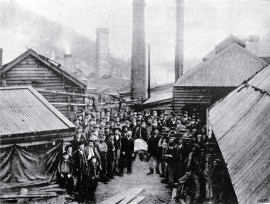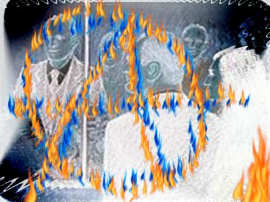
I‘ve never been a union member — I don’t really think I’d be a good fit. I have worked (in non-union jobs) in a union environment (though it was a Teamsters shop in the ’70s… not exactly the best showcase for the postive aspects of trade unionism).
I understand the collective bargaining system and — though it is clearly far from perfect and may not be well-suited to modern, progressive companies — I think over the last century and change that it has, on balance, worked fairly well for both US workers and companies, bringing some much needed stability to employment relations at the end of the 19th century and laying the foundation for the 20th century American middle class, which, itself, nurtured the enormous expansion of US manufacturing in the last century.
But at the dawn of the union era, it was a different matter. Around the globe, workers in the industrializing nations of Europe and North America faced unsafe working conditions and violence and intimidation from privately held companies. While stockholders might blanch at the thought of company-hired goons firing what we now call “live rounds” into crowds of workers and splitting heads with metal clubs, individual mine and factory owners all too often didn’t.
It’s a different time, now, of course.
But only a few days ago with the Sago mine disaster/debacle, we had a grim reminder that even modern, publicly held companies can fall down and fall down hard when it comes to treating their workers with common decency and regard for their safety and health.
And the part of our federal government devoted to policing those conditions fell down hard, as well, handing out scores of hazard violation citations — but backing them up with trifling punishment. In one case — at a Sago mine — the company was cited for “significant and substantial” violations and ongoing dangerous conditions that led to the death of miner — and then fined the minimum possible — $60.
Maybe we haven’t evolved beyond the need for unions, after all…
The Company Says
You walk into town
and you look all around
and it doesn’t take long
to see that something is wrong
very wrong
the people stand around
with their eyes on the ground
it doesn’t take long
to see that something is wrong
and the company says
it’s a company town
now, if you don’t like that
don’t ya hang around
and the Company says
it’s a company town
if you don’t like that
sell a penny on the pound
give ‘way
One man stands
says I won’t run
but the goons come around
with their clubs and guns
and they knock him down
and they kick him around
and they drag his body
to the edge of town
and the company says
he’s better off dead
than fightin’ with us
and the company says
it’s a company town
if you don’t like that
we’ll put you in the ground
and the Company says
it’s a company town
now, if you don’t like that
don’t ya hang around
and the Company says
it’s a company town
if you don’t like that
sell a penny on the pound
give ‘way
and the company says
he’s better off dead
than fightin’ with us
and the company says
it’s a company town
if you don’t like that
we’ll put you in the ground
(C)1986, TK Major




